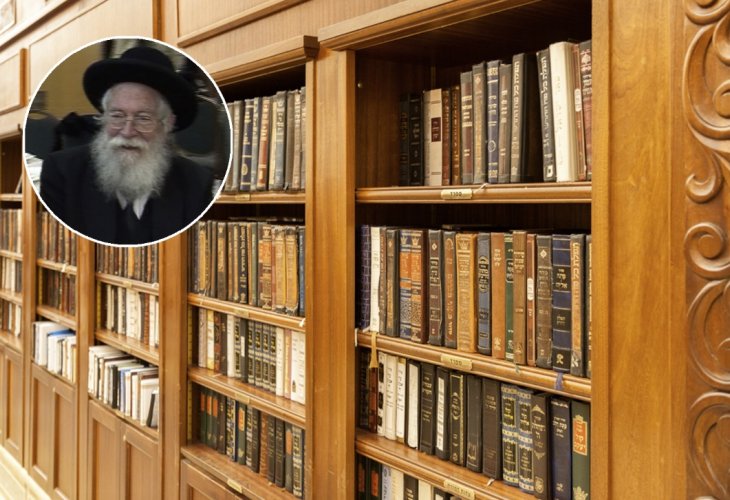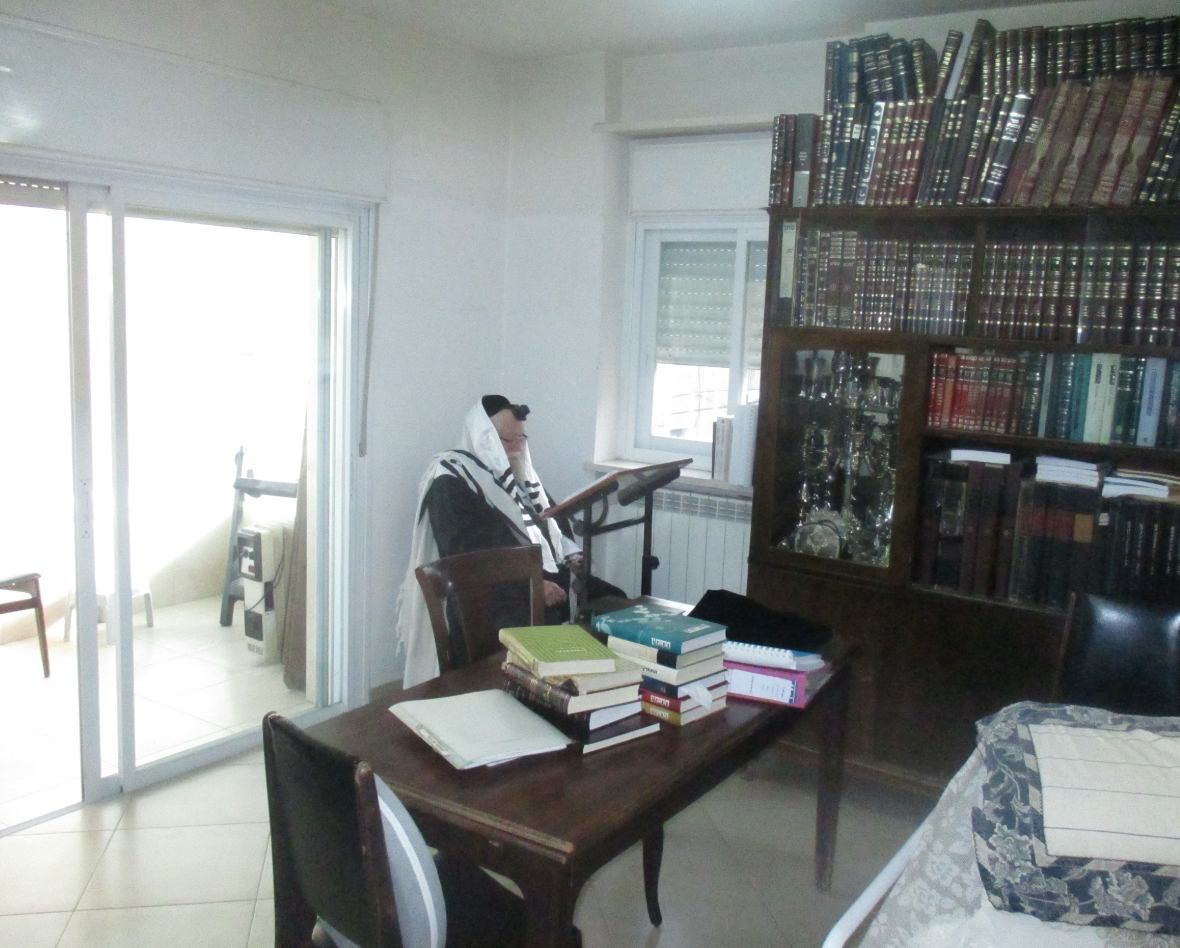Torah Personalities
The Humble Giant: Remembering the Late Rabbi Zalman Nechemia Goldberg
A Torah giant of rare brilliance and humility, whose quiet greatness shaped generations of scholars and dayanim (judges)
 (In circle: Rabbi Zalman Nechemia Goldberg)
(In circle: Rabbi Zalman Nechemia Goldberg)A Torah Scholar Across Generations and Sectors
In the summer of 2020, the Jewish world lost one of its most revered halachic (Jewish legal) authorities: the late Rabbi Zalman Nechemia Goldberg. Known by the acronym HaGaRZaN, he was a rare blend of genius, humility, and dedication, so much so that he was once described as “the gaon (Torah giant) who didn’t realize that his face shone with light.”
Rabbi Goldberg taught Torah across communities and sectors, delivering dozens of weekly classes across Israel. He served as a dayan (rabbinical judge) on the Supreme Rabbinical Court, headed numerous yeshivot, edited the monumental Talmudic Encyclopedia, and mentored an entire generation of halachic scholars and judges. Many considered him the spiritual heir to his father-in-law, the late Rabbi Shlomo Zalman Auerbach.
Born in the Soviet Union in 1931, his life was steeped in Torah from infancy. Shortly after his brit milah (circumcision), his father, a rabbi in Minsk and a student of the Novardok Yeshiva, was sentenced to 10 years in Siberia for “spreading Torah.” The interrogators sneered: “You’ll die in Siberia, and your son will grow up to be a model Communist.” But from Siberia, the father wrote a letter to the rabbi of Minsk, begging him to ensure his infant son would grow up immersed in Torah.
Miraculously, the elder Rabbi Goldberg was released after a few months, and the family made their way to the Land of Israel. From a young age, Zalman Nechemia was known for his extraordinary diligence, memorizing entire sections of Tanach and Mishnah by heart. His father walked him to shacharit (morning prayers) each morning, and on the way, they would review Mishnayot, building the foundation for a lifetime of Torah mastery.

Humility in Greatness, Kindness in Judgment
Rabbi Goldberg’s greatness was matched only by his humility. He never asked anyone to serve him, not even at the Shabbat table. As his son recalled, “He never said, ‘Bring me the salt,’ or ‘Pass me the bottle.’ If he needed something, he got up and took it himself.”
He lived with quiet discipline. His wife carefully structured their home life around his Torah schedule. She ensured meals were ready on time and the house was a place of peace, allowing him to focus entirely on learning and teaching.
Despite his stature, Rabbi Goldberg declined all offers of personal drivers. Even in his late 80s, he could be seen riding public buses across Jerusalem, from the Talmudic Encyclopedia offices to his classes in Bayit V’Gan and the Great Synagogue. “Taxis are for important people,” he would say. “I can take the bus.”
As a dayan, he was scrupulous in monetary law. Though entitled to state-funded taxis, he never used the benefit. He even refused free rides from students, fearing it could constitute a form of bribe, especially if they had appeared before him in court or might in the future.
Once, a student insisted on paying a symbolic fee for semikha (rabbinic ordination) tests. Rabbi Goldberg accepted the 200-shekel note but placed it in an envelope for his household helper, a righteous convert. His integrity in financial matters was legendary.
A Heart of Compassion, A Mind of Precision
He dealt gently with all who approached him. His sons recalled how, even when attacked or insulted in court, he would whisper, “Don’t respond. Don’t raise your voice.” His life embodied the verse, “They are insulted and do not insult in return.”
He never displayed anger, except once, when someone spoke disrespectfully about the Avnei Nezer, a revered Torah authority. “That was the only time we saw him truly upset,” his son admitted.
Rabbi Goldberg lived simply, radiating joy. “We are the happiest people in the world,” he told his children. “Even if you want something and don’t have it, you don’t need it. And if you think like that, you’ll stop wanting it at all.”
His intellectual brilliance extended to modern halachic challenges as well. He was among the first to analyze the legal status of ventilators and organ donation, and he addressed issues in copyright and computer software long before they were widely understood. He anticipated halachic dilemmas that others hadn’t yet begun to imagine and left behind a treasure trove of responsa still studied today.
True Anivut: Hidden Piety, Lifelong Modesty
His humility was astonishing. He was once deeply moved when a synagogue gave him an aliyah (called him to the Torah). “I understand, they honored me because I have a white beard,” he said. “But how did they know my name? I don’t know any of them…”
He took no pride in his reputation. When people treated him with awe, he seemed genuinely puzzled.
He was equally remarkable in his kibbud av va’em (honoring his parents). After losing his only sister in the War of Independence, he moved to a yeshiva near his grieving parents to be close to them, even though it meant leaving the prestigious Ponevezh Yeshiva. “To this day,” he later confessed, “I feel bad about the pain it caused the Rosh Yeshiva of Ponevezh.”
Even his rare moments of envy were rooted in holiness. “Once in my youth,” he told his son, “I envied a student who had the key to a locked synagogue library with rare books. I so badly wanted access to those sefarim.”
A Legacy of Torah, Humility, and Integrity
Despite his towering scholarship, Rabbi Goldberg constantly feared he may have spoken disrespectfully about a Torah giant. When visiting the Rambam’s gravesite, he gathered a minyan and asked forgiveness, just in case he had ever spoken too strongly while analyzing the Rambam’s words.
His students, many now dayanim and rabbis across the world, remember him not only for his sharp halachic mind but also for his gentle demeanor, his deep empathy, and his refusal to ever inconvenience another person. He was a gaon in Torah and a giant in middot (ethical behavior).
As his brother-in-law, Rabbi Azriel Auerbach, said tearfully at the funeral: "We are now eulogizing a Har Sinai… He embodied the two tablets—between man and man, and between man and Hashem. But more than anything, he lived the verse: ‘Walk humbly with your God."

